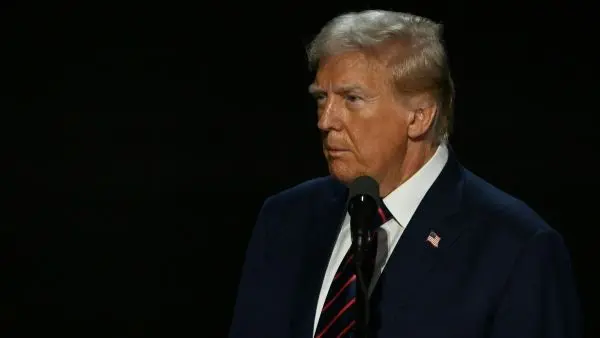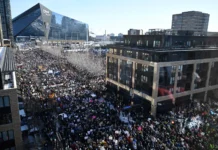“Pay us for defense” – What do Trump’s comments on Taiwan mean?
Hong Liuxing
Donald Trump’s comments about US military support for Taiwan in the event of a Chinese attack have had a chilling effect on the island’s political establishment. Many interpreted the Republican presidential candidate’s statement as akin to a shake down for “protection money”.
In a Bloomberg interview on 16 July, Trump said Taiwan should “pay us for defense,” comparing the US to an “insurance company”. Taiwan “doesn’t give us anything” he complained, when in fact the Taiwanese government has always paid top dollar for the military hardware the US sells it.
The US Congress approved an 8 billion USD arms package for Taiwan and other Indo-Pacific states in April, which for the first time is financed directly by the US. But almost half this allotted sum will be spent in the US to modernise its submarine-building industry.
Trump also appeared to cast doubt over the viability of US intervention in any future war over Taiwan. “Taiwan is 9,500 miles away [from the US]. It’s 68 miles away from China”, he said. Taiwan’s preeminent semiconductor industry was the main bone of contention in Trump’s rant, which sent major chip stocks tumbling not only in Taiwan. “Taiwan took our chip business from us,” he said. This is yet another Trump statement that won’t pass a basic fact check.
Trump’s possible return to the US presidency in November’s election underlines the deep crisis of US capitalism and therefore also of global capitalism. Not only would a new Trump government threaten vicious attacks on US workers, women, migrants and the poor, but globally too, it could strengthen reaction everywhere unless there is massive fight back by the workers’ movement. Biden’s Democrats, the other main party of US capitalism, have created the conditions for a possible Trump comeback through their own brand of anti-working class policies.
The conflict between US imperialism and its main challenger, Chinese imperialism, is the most important global trend of our age. This has set off a wave of militarization, not least in Asia including Taiwan, and has shaped the character of brutal wars such as in Gaza and Ukraine, making them even more dangerous and complicated.
For both the Chinese and US capitalists, Taiwan is a crux issue, and not primarily because of its dominant role in the global chip industry, although that further increases its significance to both sides. Taiwan is a strategic tool in the US strategy to contain Chinese imperialism and prevent it from dominating the Asian continent and thence also the global economy. Xi Jinping’s designs on Taiwan are a mirror of this.
Trump is deeply unpredictable. But do his comments signal a u-turn on an issue of such global strategic importance for US imperialism? Rather this is a form of rhetorical brinkmanship.
Trump is known for such tactics. He used threats to pull US troops out of Europe and Japan to pressure these governments to speed up militarization. In the case of NATO, which Trump has on several occasions threatened to leave, the onset of the Ukraine war has led to most NATO members dramatically upping their military budgets to ‘Trumpian’ levels.
Taiwan’s Premier Cho Jung-tai responded to Trump’s remarks by touting the island’s increasing defence spending (a 56 percent rise over the past ten years) and extension of conscription from four months to one year. In a display of vassal-like behaviour, he further stated that Taiwan is “willing to take on more responsibility” in the Indo-Pacific. Ultimately, this means exacting a greater cost on the working class in Taiwan, only to increase the threat of war.
For Beijing, there is no preferred candidate between Trump and the Democrats. A professor at Fudan University calls it “two bowls of poison” for China. Biden’s strategy was to systematically build up military containment in the region around China: the Philippines, Taiwan, Japan and South Korea.
Trump has chosen an arch-China hawk, J.D. Vance, as his Vice President pick. Vance has been outspoken about US intervention to defend Taiwan, arguing for more weapons to Taiwan instead of Ukraine. Firstly, this shows that anti-Ukraine war sentiment in the populist wing of the Republican Party is about prioritizing the fight against China, rather than peace. Secondly it shows that a future Trump presidency is likely to be dominated by anti-China cold warriors no less than Biden’s has been. Accordingly, US policy towards Taiwan will continue as part of this bigger template.
In his first term, Trump’s record was to further beef up US-Taiwan military ties. He angered Beijing by approving more than 18 billion USD worth of arms sales, and passed a law that encouraged senior US officials to visit Taiwan. In 2017, before even entering the White House, Trump famously made a phone call to Taiwan’s former president Tsai Ing-wen, something no US leader has done since 1979. The Chinese regime was enraged. Military build-up is of course not a deterrence against war. Rather, it forces both sides into competing for bigger stockpiles of arms while fanning nationalism and raising the political stakes for all the ruling groups. This is the logic of imperialism.
What Trump’s comments have exposed is the shallowness of US imperialism’s narrative of “democracy vs autocracy”. Taiwan is not being armed to the teeth because it is an “island of democracy” (an exaggerated claim), but because in the eyes of the Pentagon it is an unsinkable aircraft carrier against China. By this fact alone, a future Trump administration is unlikely to “sell out” Taiwan for merely an economic bargain with China, as that would represent a historic retreat for US imperialism.
Taiwan’s pro-US Liberty Times reassured its readers not to take the ex-president too literally. It described his sensational comments as a tactic and a political performance, pointing out Trump’s inconsistency when for example earlier this year he claimed that if China had invaded Taiwan while he was president he would have bombed Beijing!
Trump is also wrong about Taiwan’s dominance in the semiconductor industry. The vast majority of profits are made in chip design, by US companies like NVIDIA, rather than in chip foundries further down the supply chain like Taiwan’s TSMC. Nevertheless, Trump’s comments reveal a new consensus within the US political establishment. Both the Democrats and Republicans now favour state capitalist industrial policy in an attempt to rebuild America’s lost industrial base. Taiwan’s TSMC has already invested 65 billion USD in three chip fabrication plants in Arizona, the largest foreign investment in manufacturing in US history.
The indications are that Trump wants to bring up tariffs to protect the competitiveness of US-made chips. US imperialism does not want to be too dependent on Taiwan for chip production, while at the same time, Taiwan’s edge in this sector cannot be replicated elsewhere. Neither Trump nor the Democrats, defend democratic rights whether overseas or in the US itself. Trump openly flouts his anti-democratic bias, recently praising Xi Jinping as a “brilliant man” who “controls 1.4 billion people with an iron fist”. Meanwhile, “liberal” US imperialism under Biden has backed Israel’s racist “democracy” in its genocidal war against Gaza. US imperialism for decades supported and armed the Kuomintang’s brutal white terror dictatorship in Taiwan until such a time as it felt that capitalism and US dominance in Asia were no longer threatened.
Because of the aggressive militarized nature of imperialism, the threat of war over Taiwan will exist as long as capitalism exists. A more dangerous and uncertain future lies ahead, with capitalism’s deepening crises producing political leaders like Trump and Xi Jinping. Only by overthrowing capitalism can the threat of war be eliminated. Joint struggle by workers in Taiwan, China and around the world, against militarization, dictatorship and imperialism is the only way forward.




